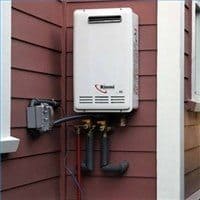The Water softener Dilemma
Hard water is
a problem many of us have to live with and its effects on our hot water heaters
is one of the key aspects of the water softener dilemma I will be discussing on
this post. Water softeners help reduce the concentration of dissolved minerals
in your tap water. If you do not like to have mineral in your water due to
taste or some other reason, you might want to install one of these. Hard water
can have adverse effects on the performance of your water heater although soft
water is also not that good.
It is not very
surprising to find out that hard water is reducing the efficiency of your water
heater. This is because water stays in a stagnant state in your hot water tank
for some reason and that lets some of the minerals in it to settle down inside
the tank. Over time, a calcium layer will build up inside the unit, creating a
barrier between the inner surface of the water heater and the water. As you
should have guessed calcium is not that good at conducting heat to water and
when you have calcium inside the tank, the water heater’s burner will have to
do extra work so that the heat can actually pass onto the water. The water
heater will be heating itself more and it will be heating the water less. More
energy will be wasted before the same amount of water is heated. The adverse
effects of mineral build up is not limited to a decrease in efficiency. It will
also shorten the life span of the unit, which now has to work harder. Moreover,
when water gets between the mineral layer and thesurface of the water heater,
it will come across excessive heat and it will boil, causing coughing and
spluttering at the tap. Boiling water will also leave all of its minerals,
leading to even more mineral buildup.
A water
softener is remedy to the adverse effects of hard water but it does create its
own problems. When the water has little dissolved minerals in it, its ability
to dissolve stuff increases. In other words, softened water is hungry water. It
will eat through the anode rod much quicker and eventually destroy your water
heater through corrosion. Mineral buildup and corrosion are the two major
causes that kill water heaters at the end. As seen, by installing or not
installing a water softener, you are choosing one of these as the destiny of
your water heater and this is quite a dilemma indeed.
Tankless Water Heaters Help with the Issue
Tankless water
heaters are also affected by mineral buildup and can need a flush every year or
so. But in many cases, they survive without the flush. Because the water does
not stay inside a tankless water heater for so long a time as it does ibside a
storage water heater, the effects of minerals and corrosion are significantly
reduced. This is why tankless water heaters last longer. Saving yourself from
the hard water dilemma is just one of the great reasons for choosing a tankless
unit as your next water heater.




